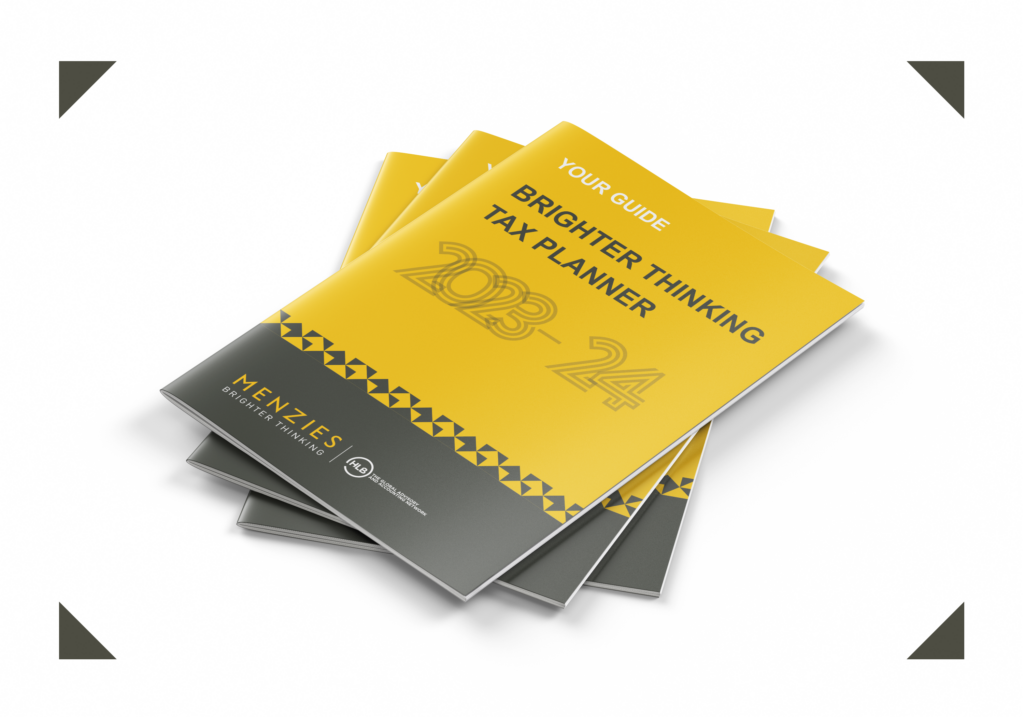Essentially, where your estate is worth more than £325,000 at death, there could be IHT to pay by your executors. IHT is a complex area and regular advice in this area is strongly recommended as a person’s IHT exposure is likely to change from year to year.
As a general guide, it is key to make sure that you have a tax efficient Will in place and that you consider taking appropriate life assurance cover to help protect your family financially. The Office of Tax Simplification undertook a review of IHT suggesting that it should be fundamentally changed.
The government have responded to the suggestions by saying that at this point they do not intend to reform IHT and intend to maintain the nil rate band at £325,000 until at least April 2028.
In addition to a regular consideration of your IHT exposure, you may wish to use the year-end to consider the following:

Download our Brighter Thinking Tax Planner
Download nowUtilise your IHT annual exemption
Gifts of up to £3,000 per year can be made on an IHT free basis. The limit increases to £6,000 if the previous year’s annual exemption was not used. A married couple can therefore make IHT exempt gifts totalling £12,000 in one tax year, where no gifts were made in the prior tax year. This simple technique could save a possible IHT bill of £4,800 in the event of your untimely death.
You should also consider using other annual gifts such as gifts in consideration of marriage or £250 small gifts.
Normal expenditure out of income
There is an exemption for making regular gifts out of income of any size where certain conditions are met. This exemption means that sizable gifts can potentially be made but in a way that the gifted amounts instantly fall outside of your taxable estate upon death (rather than waiting for a seven year period). Take care where living costs increase and result in a reduction of excess income available for gifting.
Business relief (BR)
This is a valuable IHT relief which may apply to exempt or partially exempt business property on death. BR is an important part of succession planning but, due to the complexity of the BR rules, the relief may not be due even though you expect to meet the conditions. It is important to regularly review your BR position to ensure that it continues to apply and that your business activities do not jeopardise your BR position.
Passing on your pension
Key changes to the taxation of pension death benefits were introduced in 2015. These changes can allow an individual to pass on their pension pot from generation to generation in a tax efficient manner.
Since then, if death occurs before the age of 75, the pension fund can be passed on tax-free to a beneficiary. If death occurs after 75, the fund can be drawn by a beneficiary at their own marginal rate of tax. A beneficiary will have the option to receive the death benefits either as a lump sum, drawdown or an annuity. The definition of a beneficiary is much wider than that of a dependent, allowing considerable freedom in choosing who you want to benefit from your pension fund.
If death benefits are paid as a lump sum, those benefits would form part of a beneficiary’s estate. Therefore, an efficient way to pass on death benefits is to consider ‘dependents drawdown’. This would allow the beneficiary to continue to enjoy the tax advantages associated with investing in a pension, whilst allowing them to draw income as and when required. The fund could then be used as a further legacy for them to pass on to their own beneficiaries.
It is important that death benefit nomination forms are reviewed as individuals who you want to have the option to benefit from dependents drawdown will need to be included on these. In our opinion, pensions should be considered in the context of IHT and alongside any Will planning.
It is also important to review whether your pension scheme provides for those flexibilities.
Your BrighterThinking next steps
“Consider your Inheritance Tax position and possible exposure in the event of your untimely death.
Do you have a note of your worldwide assets, including access codes for investments held online?
It is useful to create a single document containing details of all your assets which is available to your Executors in the event of your death.
Make use of the IHT exemptions each year, where possible, to reduce your exposure. Consider how you can use any pension pot for IHT planning.
Do not dilute your estate to the extent you make insufficient provision for your own position and possible support you need to make in the future.”
David Truman – Private Client Partner
#
Click the below to access each part of our Inheritance Tax (IHT) planning guide:

Download our Brighter Thinking Tax Planner
Download nowIHT and wills

The cornerstone of any effective IHT planning is your Will. It is important that your current Will is up to date and in line with your future wishes.
A review of your Will can help to ensure that all details are correct and there are no misstatements which may lead to parts of your estate not being administered as you intended. Failure to do so can also have an adverse effect on your inheritance tax position and the amounts chargeable to inheritance tax.
If you do not have a Will in place, we would advise taking the time to create one and therefore minimising the risk that the State will determine how the assets are distributed on death under the intestacy rules (a form of heirship).
Menzies are able to assist you with advice on the preparation and review of your Will as well as answering any questions you may have in this important and complex area.
Your #BrighterThinking next steps
“In the event you do not already have a Will, we would recommend
Helen Cuthbert – Private Client Director
you arrange to have one put in place. If you have not reviewed
your Will for two years, we recommend you revisit.”
Additional residence nil rate band

As of 6 April 2017, if an individual passes on their home to a direct descendant on the individuals’ death, an additional Residence Nil Rate Band (RNRB) is available for an estate.
Any unused RNRB can be transferred to a surviving spouse or civil partner. For the 2020/21 to 2025/26 tax years the RNRB that may be available will be £175,000.
This additional allowance when reviewed in conjunction with a review of your Will could be beneficial to many individuals and should be taken into consideration with regards to any future tax and estate planning.
Your #BrighterThinking next steps
“Ensure your Will does not prevent you making use of the Additional Residence Nil Rate Band.”
Craig Hughes – Menzies Private Client Partner
Planning for the future

It is never too early to get started on planning ahead for the future. Having a plan in place will not only ensure your affairs are structured in the most tax efficient manner, but also allow you to optimise and consider your estate position and possible investment options.
There are many different aspects to consider when looking to plan ahead for the future, including the possibility of moving to or departing the UK, current domicile position and the inheritance tax implications associated with domicile, retaining your profits and tax efficient savings for financially secure retirement.
Your #BrighterThinking next steps
“Ensure your Will says what you want it to say. Ensure you understand your Will and make time to consider your IHT position both for yourself, and as a family.”
David Truman – Menzies Private Client Partner
Family investment companies (FIC’s)
Several options are available to protect against an outright gift of wealth for those seeking to pass assets to the next generation while considering inheritance tax efficiencies. The key routes being to either create a family trust or to establish a family company. The transfer of assets into a family trust is a tried and tested mechanism for ensuring the benefit of the family wealth is gifted to the younger family members, without giving unfettered access to the underlying assets. Control is centred with the Trustees who protect and administer the assets (and in certain instances, the income from those assets) for the benefit of the ultimate beneficiaries, being the children and grandchildren. An alternative is to consider a family company which may provide a more tax efficient landscape with similar flexibility. In addition, one advantage is that the corporate structure is a framework which is familiar to many. The aim being to provide the children with the shares that hold the growth value, while retaining control mechanisms for the older generation by way of directorships, voting rights and preferential share classes. The structure is best utilised where funds are retained within the corporate, minimising the double taxation charge where profits are extracted annually. The attractive tax rate for corporates (even given the upcoming raise to 25%), the possible availability of a dividend exemption and the ability to deduct reliefs such as full mortgage interest for rental property, assist in the tax efficient environment. HMRC have recently agreed that there is no correlation between those setting up a Family Investment Company and non-compliant behaviour and their dedicated unit set up to investigate the tax risks associated with FICs has been disbanded. Although future changes in tax legislation cannot be discounted, FICs firmly remain a key planning tool for families wishing to protect their assets across the generations. Given the possibility of a rise in capital gains tax rates due to the current climate, it may now be the moment to transfer assets into a corporate and capture gains at current rates of up to 20%, while considering the inheritance tax implications for the family.
Probate
Having supported you throughout your working life and then into your retirement, we are also experienced in dealing with and providing probate advice and estate advice.
Although probate matters are not traditionally viewed as a “year-end” matter, taking the time to consider the provisions you want to make for the future should be at least an annual assessment. As the trusted advisor, we aim to support your family and beneficiaries at the times we are needed. We have specially qualified partners and staff who can assist with a wide range of services. We also have partners who are able to act as Executors and Trustees, if required, along with members of your family.
We feel that we are well placed to provide probate services, having worked with you throughout your life to create a plan for your wealth. As accountants, we believe that we are well suited to the provision of probate services, as we specialise in accounting, taxation and administration. We also have a number of STEP qualified members within our team.

Download our Brighter Thinking Tax Planner
Download nowYour #BrighterThinking next steps
“Undertake an annual assessment of your own wishes. Assess whether you would like Menzies to assist with probate matters in the future; consider updating your Wills accordingly such that your family members do not have to decide on this in the future.”
Craig Hughes – Private Client Partner
Menzies Private Client Team

Personal tax planning can be complex. We would always recommend that you seek professional advice when undertaking a review to ensure all changes are processed and managed effectively. Please do speak with your Menzies contact who will be delighted to meet with you to discuss ideas, opportunities and the appropriate action.
To discuss your income tax planning arrangements for the tax year ahead, contact Menzies Private Client Team below:
